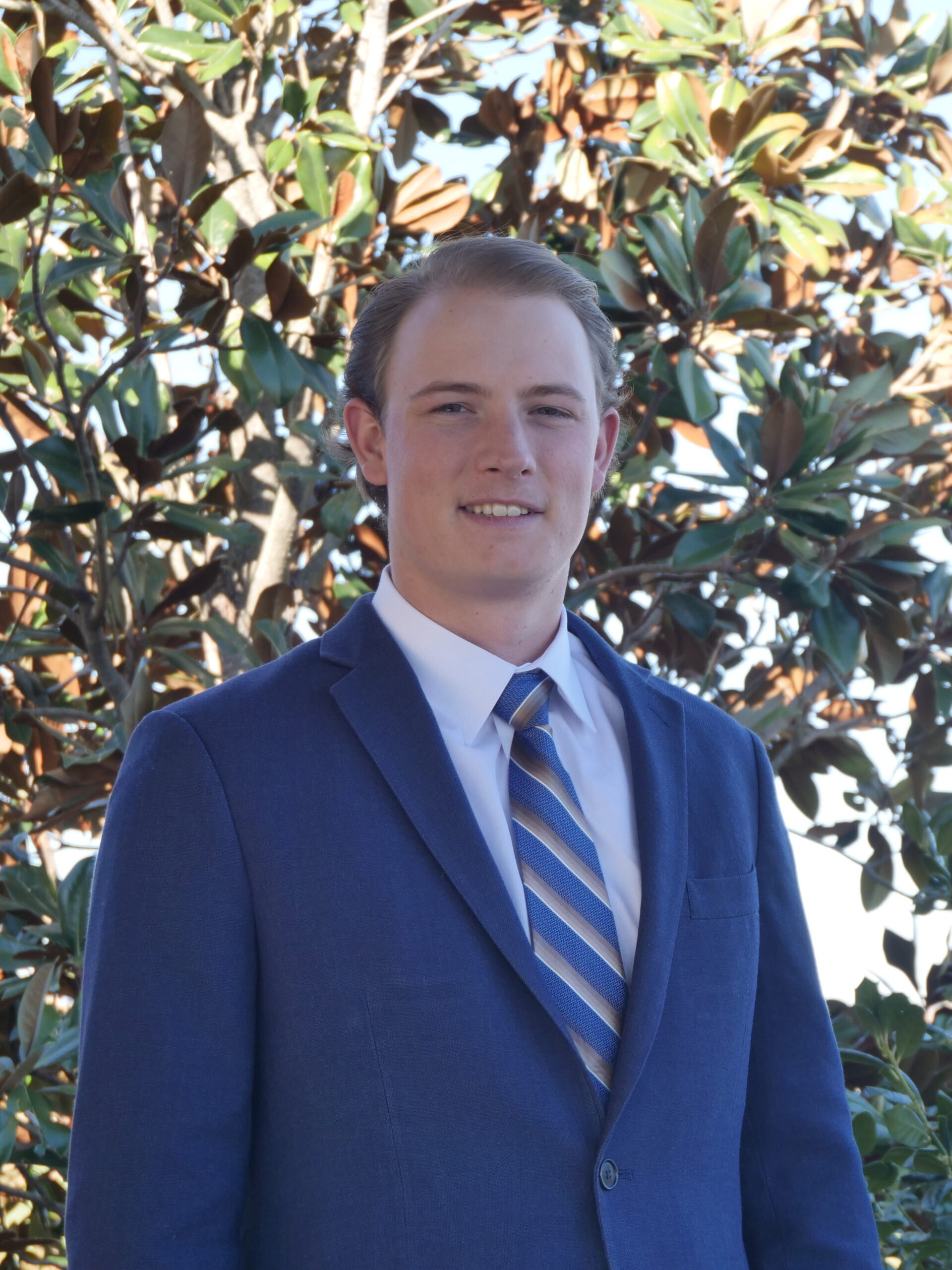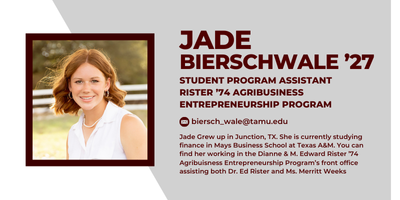Owen Sanders ’27: Merging Livestock Passion with Entrepreneurship

Owen Sanders '27
AGEC 425 Student
Agricultural Background
Owen Sanders '27 has always had a deep connection to the livestock industry. Growing up
in Cedar Park, a Suburban area near Austin, Owen stayed actively involved in agriculture from an
early age. His father, a lawyer specializing in livestock cases across the United States, played a
significant role in shaping Owen’s interests. Coupled with his extensive involvement in 4-H and
FFA—where he spent his high school years showing livestock, in addition to being involved with
several activities, notably the TYLA Livestock Ambassador Program. The Livestock Ambassador
program provided Owen the opportunity to develop and practice advanced leadership skills related
to mentoring other youth, and to become an advocate for animal agriculture. Through his
involvement, Owen’s passion for the livestock industry was solidified. His dedication to FFA was
recognized when he earned the American Degree, a national honor in the organization, a step above
Texas’ Lone Star Degree.
His exposure to entrepreneurship came from an unexpected source: the donors at his local
livestock show and auction. Owen noticed a common theme—many of the top bidders were
entrepreneurs who had built their own businesses from the ground up. Fascinated by their success,
he wanted to learn how to combine his passion for livestock with business innovation. That
curiosity led him to Dr. Ed Rister’s Agribusiness Entrepreneurship Program during a college visit to
Texas A&M, where he saw firsthand how he could turn his aspirations into reality.
As an Animal Science major with a minor in Agribusiness Entrepreneurship, Owen quickly
immersed himself in the program’s coursework. Through his introductory classes, he connected
with Rachel Cutrer, a frequent Prof-for-a-Day speaker in AGEC 223/423 and the owner of BRC
Cattle. His relationship with Mrs. Cutrer led to a summer internship at BRC, where he gained handson experience in the seedstock cattle industry. This internship not only deepened his appreciation
for the livestock business but also sparked the idea for his AGEC 425 business project—Sanders
Custom Calf Raising.
Sanders Custom Calf Raising
Sanders Custom Calf Raising is designed to serve purebred cattle breeders who lack the
resources to perform embryo transfers. Owen’s business owns a group of surrogate cows
(Recipient Females) that are impregnated bred with client embryos. Once the calves are weaned,
they are returned to the client. This model allows Owen to blend his expertise in livestock
management with his entrepreneurial ambitions.
Pros of the Business Model:
- Avoids some of the volatility of the cattle market.
- Offers an innovative and unique service that is not widely available.
- Provides value to purebred breeders by increasing efficiency in embryo transfer programs.
Challenges and Cons:
- Low success rates of embryo transfers present financial and operational risks.
- Management of the Recipient females requires extensive strategic planning
- Sales projections and future productivity measurements remain a challenge
While the profitability of the venture is still being evaluated, Owen has refined his business
plan with the help of Dr. Rister and the AGEC 425 instructional team. His work has transformed
what started as an idea into a structured, feasible business plan. At a point where Owen was feeling
discouraged, he recalls attending a Prof-for-a-Day presentation by Colton Bubela. He admired Mr.
Bubela’s drive to build a career out of what he loves, reinforcing Owen’s belief in the power of
entrepreneurship.

Recognition at the Entrepreneurial Dreams Symposium
At the 2025 Entrepreneurial Dreams Symposium, Owen was selected as a finalist in the AGEC 425 Business Pitch Competition. He earned Honorable Mention, just missing the top three.
Beyond the Classroom
Outside of the Agribusiness Entrepreneurship Program, Owen is actively involved in the
Saddle and Sirloin Club, where he supports the Texas A&M Livestock Judging Team. He values the
extensive resources available at Texas A&M, noting, “There are people all over the country who use
the cattle research done at Texas A&M, and we have direct access to that information.” His
engagement with professors and industry professionals has even led to an exciting new
opportunity—an upcoming internship at a cattle station in Australia this summer.
Owen is not just learning about entrepreneurship—he’s actively practicing it. He owns and
operates Sanders Custom Leatherworks, a budding small business that reflects his passion for
craftsmanship and business development.
With a future rooted in agriculture, business, and innovation, Owen Sanders is proving that
entrepreneurship isn’t just about building a company—it’s about creating opportunities, embracing
challenges, and turning passions into reality.
